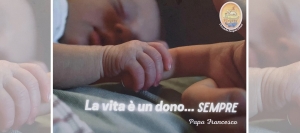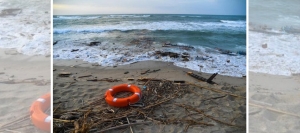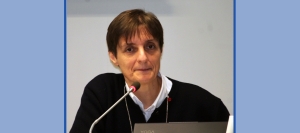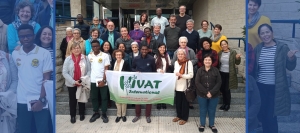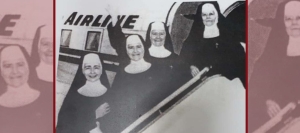Redazione
Help for Life Center
Sr Anna Grazia Di Liddo, ASC

Responsible in the Face of Pain
On behalf of the International Union of General Superiors, I want to express our deep sorrow at what has been happening these days in Italy following the February 26 shipwreck of migrants near the beach town of Steccato di Cutro close to the town of Crotone. Every day we witness terrible images that grieve us and arouse mixed emotions. We feel outrage at seeing the number of victims growing inexorably, and we experience emotion and indignation at the great number of deaths of innocent men, women, and children, while the generosity of rescuers and the testimony of local people edifies and encourages us to always be on the side of the other.On behalf of the International Union of General Superiors, I want to express our deep sorrow at what has been happening these days in Italy following the February 26 shipwreck of migrants near the beach town of Steccato di Cutro close to the town of Crotone. Every day we witness terrible images that grieve us and arouse mixed emotions. We feel outrage at seeing the number of victims growing inexorably, and we experience emotion and indignation at the great number of deaths of innocent men, women, and children, while the generosity of rescuers and the testimony of local people edifies and encourages us to always be on the side of the other.Along with the controversy over what could have gone differently, we question the value of existence, hospitality and solidarity, while Pope Francis continues to call everyone to fraternity as the core value of true humanity. We are bombarded with opinions while sea rescues of boats at risk continue with hundreds of men and women trying to reach the shores of Italy. But the crammed first-reception centers are incapable of providing an adequate response to an unprecedented migration phenomenon. The data we are given says that between January and February arrivals have doubled, and to stem the growing number, policies stategic are ...... amidst controversy and searches for responsibility. In this social framework, the International Union of General Superiors wants to express its regret at what is happening, because we are aware that we are talking about people with faces and stories ... of our brothers and sisters who in searching for a better tomorrow and hoping for a better future, risk their lives at sea to do so. In this social framework, the International Union of General Superiors wants to express its regret at what is happening, because we are aware that we are talking about people with faces and stories ... of our brothers and sisters who in searching for a better tomorrow and hoping for a better future, risk their lives at sea to do so. The death that takes place in the waters of the Mediterranean grieves us greatly. The victims who lost their lives at sea and, along with them saw their human rights drowned and their hope destroyed, cannot leave us dumbstruck. We have already, on other occasions, expended words. Now the time has come. Their cry cannot leave us indifferent any longer. We want to make their despair heard and be a voice for their pain and their wounded, demeaned and shattered dignity.Humanitarian dramas of this magnitude cannot continue to be tolerated. Laws and economic policies that disregard human rights and condemn people to misery can no longer be tolerated. This tragedy reminds us that the situation of migrants and refugees is everyone’s responsibility. We ask national and European governmental institutions, to “choose life” (cf. Deut. 30:19) by pointing out responsible and humane ways of support and aid, agreeing on humanitarian corridors, promoting equity as a principle of social justice, the basis of peace and friendship among peoples.We cannot forget that sacred history is steeped in exoduses and welcomes. As we ask the Lord for a compassionate heart, capable of genuine pity and contrition for what has happened once again because of human responsibility. we implore God to give us the strength to understand how to intervene, and not to become addicted to these images, but to stand on the side of the weak and recognize the value of the other. Life is precious; it is God’s gift and it is worth the Blood of Christ always and in all ways. We are asked for the commitment and safekeeping of a precious good for all.
Sr. Nadia Coppa, ASC - Presidente UISG
Rome, March 11, 2023
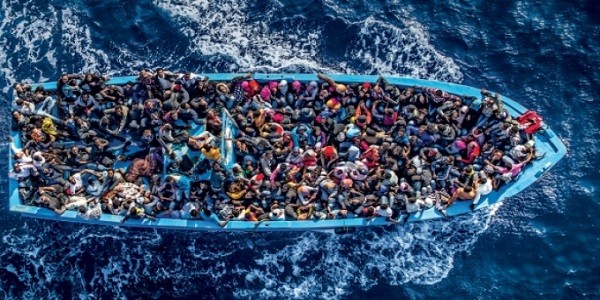
April 2023
March 2023
February 2023
Feast of St. Maria De Mattias
“Close the little garden of your heart to everything else,
keeping it open only to Jesus as the beloved bridegroom of your soul."
St. Maria De Mattias (Lett. 270 New Edition)
To all the Adorers of the Blood of Christ
Dear Sisters,
Peace and Joy in the Holy Spirit be yours!
We have begun a new year and we hope that this fast-moving time finds us ready to embrace it as a favorable time for our sanctification and for the transformation of all humanity.
As a Congregation, we are in the preparation stage for our General Assembly and we have many opportunities for reflection and delving into our call to be a prophetic presence in the Church and in the world. We recognize the call to “begin afresh from Acuto” to find the fire of our origins again, rediscovering the power of the charismatic gift we have received that is needed to deal with the inevitable changes while maintaining the foundations of the faith that do not change, but can be moved and pitched in ever new lands so as to accompany the people journeying in history.” (Working Document for the Continental Stage, n.26).
The upcoming celebratory events laid out along our path are also a help for renewing the joy of God’s gift within us. We gratefully enter into the year of preparation for the 190th anniversary of our foundation (March 4, 2024) and we joyfully celebrate the 20th anniversary of the canonization of St. Maria De Mattias (May 18, 2023). These are important milestones for renewing our commitment to the Lord as we grow in our vocation as adorer-missionaries of the Precious Blood.
As we celebrate the sacred history of our community, we want to experience these events as one big opportunity allowing us to draw light from the holiness of Maria De Mattias and savor anew the richness of our charismatic identity by renewing our sense of belonging to a living body in continuous transformation.
In the dynamics of the Church, we are embracing the call to live our synodal vocation more intensely and to recognize how St. Maria De Mattias was a prophetic woman opening important perspectives in this direction. She strove to share the mission with all those she served and included every person along her path, allowing herself be evangelized by every encounter and experience, widening the space in her tent and letting each person encounter the Crucified Love.
“My daughter, let us happily work hard for Jesus Christ and bring souls to his side. They cost him his Blood. I recommend charity and patience. Every person is dear to Jesus’ heart.” In these words we can gather the spiritual legacy left to us by St. Maria De Mattias.
She discovered that, first and foremost, faith is an attitude of the heart capable of arousing an unwavering and tireless self-giving that becomes unconditional openness to all and an opportunity for change in every concrete situation. In this light, we understand how for St. Maria De Mattias there was no better place to find God and help to look for him in the heart of every woman and man of her time. In listening to the human heart, St. Maria De Mattias made room for God and set out with everyone, recognizing and valuing each one.
Her attention in recognizing the concern for what is human as essential is moving. In the school of the incarnation she had learned to read history and to live in it with confidence. With an intimate sense of an everyday life inhabited by God, St. Maria De Mattias lived in newness and knew how to make her time a place of encounter and renewed openness to life.
She was capable of seeing and taking on what matters by living simply and in constant openness to the newness woven in daily life of closeness and sharing.
Through her profound commitment to God and remaining steadfast in the love of her Lord, she sees the beauty of a life lived in freedom, where Jesus is her only treasure, her Supreme Good, and the way for loving all without possessing anything.
Through her experience, each of us is encouraged to grow in the awareness that we can encounter God every day and following Jesus is a choice that is renewed in daily life and makes life harmonious and unified. For St. Maria De Mattias, encountering Jesus crucified is the source for continuing the journey and the strength to remain steadfast in faithfulness to the little things that make up daily life. As consecrated women, we too fulfill our vocation by cultivating the art of relationships. It is in living the “mysticism of encounter”, listening to others and searching together for the way to follow that we can shape our identity and a synodal lifestyle.
For St. Maria De Mattias, what truly matters is cultivating new relationships, feeling and living as sisters, creating an authentic life together and being at the service of each other through listening and dialogue, creating a climate conducive to sharing and co-responsibility and the participation of everyone. Each person is holy ground, possibility and treasure because she is paid for at a dear price, with the Blood of Christ. According to each person’s vocation, we are all called and needed in the task of evangelization in a synodal style.
In this way, the water in the jugs of our daily lives is transformed into the wine of joy and newness and missionary life takes on the flavor and fullness so needed at this time. (Pope Francis).
- In light of St. Maria De Mattias’ charismatic experience,
what choices can I make to cultivate the art of relationship?
Let us allow the Holy Spirit, who enflamed St. Maria De Mattias’ heart, to gently transform us and make us capable of making room for all so that each person may receive life in abundance.
St. Maria De Mattias, accompany us as we continue to let ourselves be renewed by your shining example.Legacy of Benedict XVI and consacrated life
"… It is Your Face, O Lord, that I seek!"
Pope Emeritus Benedict XVI’s paschal passing has affected us profoundly. It constitutes an important moment in the life of the Church: one that has left us feeling sincerely moved and deeply grateful. We have honoured our Pope Emeritus and marvelled at both his moral stature and the gratitude that has spontaneously arisen in those who found spiritual nourishment in his words. A choral ‘Thank you’ has burst forth from the heart of the Church.
In various circumstances, the Holy Father stated that life is not something that comes full circle but is, rather, a journey that leads to an encounter, a fullness of being. We thank the Lord for the clarity of his faith, for the gift of his thinking and for the simplicity in which he always lived and with which he communicated the depths of God’s mystery.
As consecrated women, we loved and supported the humble labourer in the Lord’s vineyard, welcoming his magisterium’s prophetic intuitions and allowing his teachings to challenge us. We will remember him for the humility and wisdom with which he accompanied the Church and those in religious life.
Retracing the years of his pontificate, it is clear that Pope Benedict sought to bring consecrated life back to its original core: the form of life that Christ chose. “Belonging to the Lord,” he said to the Superiors General gathered together at the audience held on 22 May 2006, “means to be on fire with his incandescent love, to be transformed by the splendour of his beauty: our littleness is offered to him as a sacrifice of sweet fragrance so that it becomes a witness of the greatness of his presence for our epoch, which has great need to be inebriated by the richness of his grace”.
He has encouraged us to be credible and luminous signs in the world: to be the fire of the Gospel and its paradoxes, without conforming to the mentality of this world but, rather, continually transforming and renewing our commitment, so as to be able to discern God’s will, what is good, acceptable and perfect to him (c.f. Rm 12: 2).
Pope Benedict XVI always recognized the special role of women in the life of the Church and gave them a crucial part to play: “[…] given the distinctive influence of women in society, they must be encouraged to embrace the opportunity to uphold the dignity of life through their involvement in education and their participation in political and civic life. […] The genius of women to mobilize and organize endows them with the skills and motivation to develop everexpanding networks for sharing experiences and generating new ideas.” (Message of His Holiness Benedict XVI to Participants in the International Conference on the theme: “Life, Family and Development: The Role of Women in the Promotion of Human Rights”, 20 March 2009)
“[…] the women had had an experience of a special bond with the Lord, which was
fundamental for the practical life of the Christian community, and this is always the case in every epoch and not only when the Church was taking her first steps” (Pope Benedict XVI, Angelus, 9 April 2012).
(...) His witness as a man in love with God who sought his Lord is an invitation to cultivate the desire to constantly seek a Face: “Faciem tuam, Domine, requiram” (Ps. 27: 8). And to direct one’s own journeying – both in the small, everyday steps as well as in the more important decisions – towards completing this pilgrimage of the heart.
Dear Pope Emeritus, to you we express our profound and eternal gratitude.
Sr. Nadia Coppa, A.S.C. - President of the UISG
VIVAT Spain Workshop
The River of the Blood of Christ in the State of Amazonas
When talking about Amazonia, we are speaking about a broad region including many states in Brazil: the state of Amazonas whose capital is Manaus; the state of Para with Belem as capital; the state of Acre with Rio Branco as capital; the state of Amapa with its capital in Macapa; the state of Roraima with its capital in Boa Vista and the state of Rondonia, with its capital in Porto Velho. When talking about Amazonia, we are speaking about a broad region including many states in Brazil: the state of Amazonas whose capital is Manaus; the state of Para with Belem as capital; the state of Acre with Rio Branco as capital; the state of Amapa with its capital in Macapa; the state of Roraima with its capital in Boa Vista and the state of Rondonia, with its capital in Porto Velho. The first Adorers from the Province of Schaan arrived in Para in 1936 and served for 17 years in the cities of Porto de Moz and Altamira, from which they left in March 1953 when the first Brazilian Adorers arrived to take their places. The mission of the Adorers in Brazil began in 1936 in the Prelature of the Xingu. But with the passing of time the few Sisters became sick and during WWII lost contact with their motherhouse.The ASC Mission began in Amazonas in 1947 when 4 pioneer ASC Missionaries arrived from the province of Wichita, in the United States upon invitation from the Redemptorist Fathers. The Redemptorists needed Sisters as catechists, teachers in schools and helping the sick. There were many vocations among the young women of their parish. The Fathers wanted to welcome congregations who would accept young Brazilian vocations. This was the request that Father John McCormick sent to Sister Aloysia Barthelme, Provincial of Wichita in August, 1946. In response to that request and to the letter received from Msgr. Joao da Mata Andrade do Amaral, Bishop of Manaus, the Provincial of Wichita and her Council decided to send two Sisters to visit the Redemptorist Missions along the Amazon River. Sr. Julitta Elsen went to Altamira, where the Adorers of the Schaan Province were located to encourage them and communicate to them that they would certainly open a mission in Amazonia. From Altamira, in Para, the two Sisters went to Manaus, also visiting the other Redemptorist missions of Coari, Codajas and Manacapuru. They returned to the U. S. in November 1946, taking with them the first Brazilian candidate, Noemi Cinque, the future Venerable Serafina, for her formation to religious life as a postulant and novice in Wichita, Kansas. Chosen from among the many volunteers for the mission in Amazonas, Brazil were Sr. Georgiana Heimermann and her sister Sr. Marciana Heimermann, as well as Sisters Julitta Elsen and Jane Frances Baalmann (Sr. Joana Francisca, as she was known in Brazil). On September 26, 1947 Pope Pius XII warmly approved the idea of the Mission in Amazonia and gave his apostolic blessing on the missionary work of the Adorers during the General Chapter of the Sisters in Rome, where the Provincial of Wichita and Sister Julitta Elsen were present as delegates. The four missionaries appointed for the Brazilian Mission received their mission crosses in Wichita on November 23, 1947 from the hands of the Bishop Mark Carroll, Bishop of Wichita. Father Fagan, Redemptorist Provincial of St. Louis, gave a touching homily. A Pan American flight took the four pioneers to Manaus on November 30, 1947 at 11:00a.m. Father Joao McCormick, Sister Cornelio and many parishioners were at the airport to welcome the Sisters and went to the Bishop’s house where the official welcome was given. The following day they visited the governor of the state, Loepoldo Amorim da Silva Neves, and then the North American Consulate in addition to visiting churches, schools and hospitals. During the two weeks spent in Manaus, they studied Portuguese with great commitment, helped by their teachers Lucinda and Lili Azevedo, who hosted them in their home. At midnight on December 21 the Sisters, accompanied by Father Jose Elworthy, left on the industrial motor boat from Manaus to Coari, where they arrived at 4:00p.m. on Saturday, December 25. Father Joao Maria Kreuzer had gathered the whole town, which was very small, to welcome the first Sisters that would work in Coari. On the Sunday after Christmas, December 26, Father Jose Elworthy, the pastor, celebrated a high Mass of thanksgiving for the arrival of the Sisters in Coari, in Amazonas. Thus, the Mission of the Sisters Adorers of the Blood of Christ was born in the state of Amazonas, Brazil.

